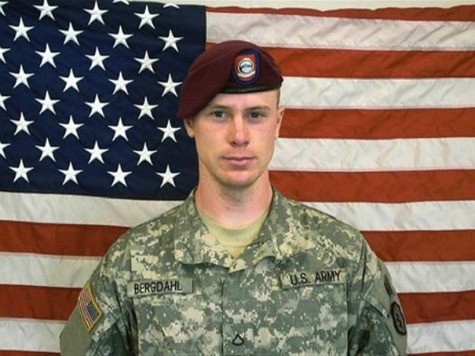In a piece that former Daily Beast head Tina Brown declared a “conclusive” account about the newly freed Sgt. Bowe Bergdahl, a fellow soldier serving in Bergdahl’s same battalion recounts the story of how Bergdahl simply walked away from his military responsibilities one night, endangering and costing the lives of many of his colleagues.
“The truth is: Bergdahl was a deserter, and soldiers from his own unit died trying to track him down,” writes Nathan Bradley Bethea, who served alongside the soldier and lost friends and colleagues in attempts to find him. Bethea asserts clearly that Bergdahl simply walked out of the camp. He did not lag behind or get lost; he openly chose to walk away:
Make no mistake: Bergdahl did not “lag behind on a patrol,” as was cited in news reports at the time. There was no patrol that night. Bergdahl was relieved from guard duty, and instead of going to sleep, he fled the outpost on foot. He deserted. I’ve talked to members of Bergdahl’s platoon–including the last Americans to see him before his capture. I’ve reviewed the relevant documents. That’s what happened.”
Bethea notes that Bergdahl did not show up to the morning roll call the next day. His company “discovered his rifle, helmet, body armor and web gear in a neat stack. He had, however, taken his compass. His fellow soldiers later mentioned his stated desire to walk from Afghanistan to India.”
His decision to walk away from the theater of war placed dozens of men in danger on a daily basis, Bethea explains, and the military made it clear to fellow soldiers they were not to speak of the events preceding Bergdahl’s disappearance, for his safety.
“The searches enraged the local civilian population and derailed the counterinsurgency operations taking place at the time,” Bethea writes. The events occurred in 2009, and many died trying to find Bergdahl, who fell into the hands of Taliban extremists. Bethea lists the names of those who lost their lives, he argues, because of a decision Bergdahl made to walk away and, thus, endanger colleagues already involved in delicate operations:
Our battalion suffered six fatalities in a three-week period. On August 18, an IED killed Private First Class Morris Walker and Staff Sergeant Clayton Bowen during a reconnaissance mission. On August 26, while conducting a search for a Taliban shadow sub-governor supposedly affiliated with Bergdahl’s captors, Staff Sergeant Kurt Curtiss was shot in the face and killed. On September 4, during a patrol to a village near the area in which Bergdahl vanished, an insurgent ambush killed Second Lieutenant Darryn Andrews and gravely wounded Private First Class Matthew Martinek, who died of his wounds a week later. On September 5, while conducting a foot movement toward a village also thought affiliated with Bergdahl’s captors, Staff Sergeant Michael Murphrey stepped on an improvised land mine. He died the next day.
Bethea ultimately writes that Bergdahl “also deserved sympathy” and that he “wouldn’t wish his fate on anyone.” He writes, too, that it was important for the military to dedicate as many resources as it did to finding him because “retrieving him at least reminds soldiers that we will never abandon them to their fates, right or wrong.” That said, Bethea concludes, Bergdahl “has much to answer for”–for the families of those fallen and the many others fortunate enough to escape the dangers in which he put them.
Bergdahl is free now, due to the efforts of the Obama administration, which argued that Bergdahl’s health was a major factor in negotiating his release. So are five of the most dangerous detainees held at Guantánamo Bay free to endanger the lives of many other soldiers in Afghanistan, adding even more potential collateral damage to the already unnecessarily high death toll to Bergdahl’s name? The Taliban is already touting the negotiation as a “victory,” increasing the outrage already present because of signs that Bergdahl himself may sympathize with the Taliban.
Adding the voice of a soldier who served alongside Bergdahl and lost friends and colleagues to Bergdahl’s errors only amplifies the sense that the Obama administration’s attempt to liberate Bergdahl represents a failure much bigger than the desertion of one soldier or the liberation of five terrorists.

COMMENTS
Please let us know if you're having issues with commenting.